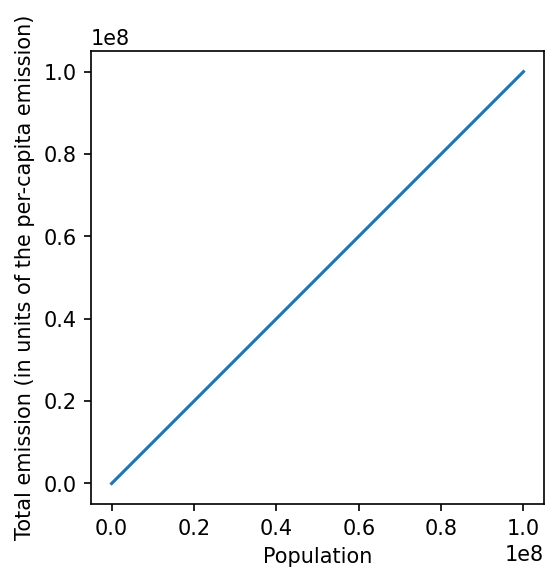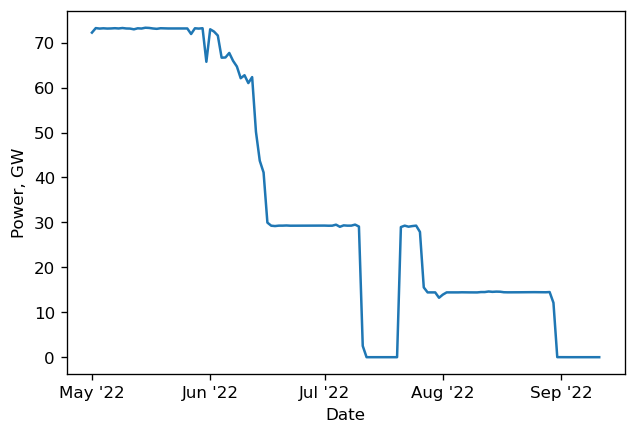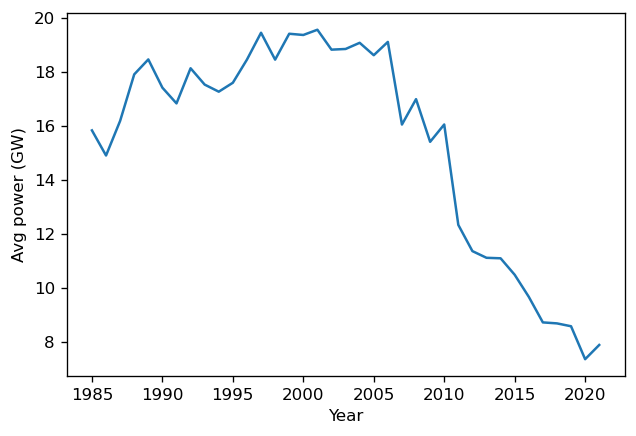
There is still substantial potential in Germany for saving energy and electricity.
– Energy Concept for an Environmentally Sound, Reliable and Affordable Energy Supply
Germany has had recent success in reducing its fossil fuel consumption by ceasing natural gas imports through Gazprom’s Nordstream pipeline.

Rate at which energy flows through the Nordstream pipeline.1
This is of course a great benefit to our planet and our climate, but it’s only a start. Germany should be more ambitious in its green transition – I’d like to indicate a few means by which it could be accelerated and enlarged.
Foregoing Nordstream reduces the supply of fossil fuels - Germany should work harder at reducing (and suppressing) demand next. This means moving less, doing less, and thinking less, as every human activity requires energy. Local governments could provide free sedatives in large urban areas, for instance, to reduce the amount of life being lived, and increase the amount of sleep. Light bulbs could be sold frosted and opaque, discouraging their use. Permits could be required for physical exercise, which increases one’s appetite for food - a notoriously carbon-heavy product. The potential scope for improvement is almost unbounded – every human drive and desire can be dulled.
A nation’s aggregate greenhouse gas emission is the product of its population and its per-capita emission, so reducing the number of people in a country makes it greener.

Immigration should be halted. Failing that, immigrants from rich countries should be prioritized over those from poor ones, who would be raising their energy consumption along with their standard of living by making the trip. Emigration to poor countries should be encouraged, preferably on foot.
In order to reduce the number of births, a strict one-child policy would work, but would likely be a tough sell politically and in any case would be cultural appropriation. A child tax would be an easier pill to swallow, but would still allow the wealthy to purchase too many children. The best approach might be a licensing system, where each additional child requires an application that can be denied without recourse or reason as necessary.
Tackling the death rate is more straightforward - voluntary euthanasia should be encouraged and its use expanded. It could be made an opt-out, rather than opt-in, option for patients, or offered as an alternative to traditional treatments for ailments like bronchitis, food poisoning, etc. Outside of hospitals, making daily life slightly more dangerous could also help with the population problem. Households could be encouraged to swap out natural gas appliances for wood burning ones, which apart from being vaguely green (biofuel) would increase particulate matter pollution. Bike lanes could be moved to the center of the road and made slightly less visible, increasing traffic fatality rates. Periodic blackouts could be made permanent. Stairways could be greased. There is nothing that could not be made at least a bit more green in this fashion.
Wholehearted adoption of nuclear power would render the green movement obsolete, so it cannot be permitted.

Year-average nuclear power production in Germany.2
Shutting down reactors is a good first step for Germany, but it won’t be enough if future generations start to get dangerous ideas about the value of competence in basic physics. Anti-nuclear messaging will never permanently solve the problem – instead, we should simply forget that nuclear power is possible.
This can be accomplished mostly in the schools. Nuclear physics courses and texts3 will naturally need to be removed, along with quantum theory and the theory of the atom, as these would quickly lead to difficult questions.4 The experimental reactors and fusion projects will also need to go; happily they are already rather underfunded. Einstein, Bohr, Fermi and the rest can be dismissed as being from the past, and therefore almost certainly problematic.
Information exchange with foreigners will be a problem, but a solvable one, as there are fundamentally only two large cultures that have to be dealt with. If the Americans posit the existence of nuclear physics, it can be declared right wing disinformation, or misinformation, whichever sounds worse. If the Chinese mention it, we need only remember that as a non-Western culture they do not share an objective reality with the West; it would be imperialist and racist to expect otherwise.
Non-existence is the only truly sustainable state for a human civilization. Germany has taken small but promising steps to approach it - this brief list may at least convince readers that it could be moving faster. Perhaps it may, and preserve this planet for the non-use of future generations.